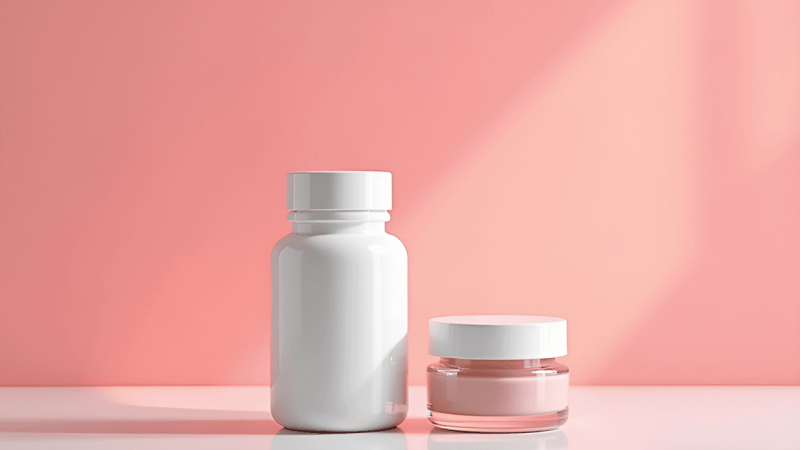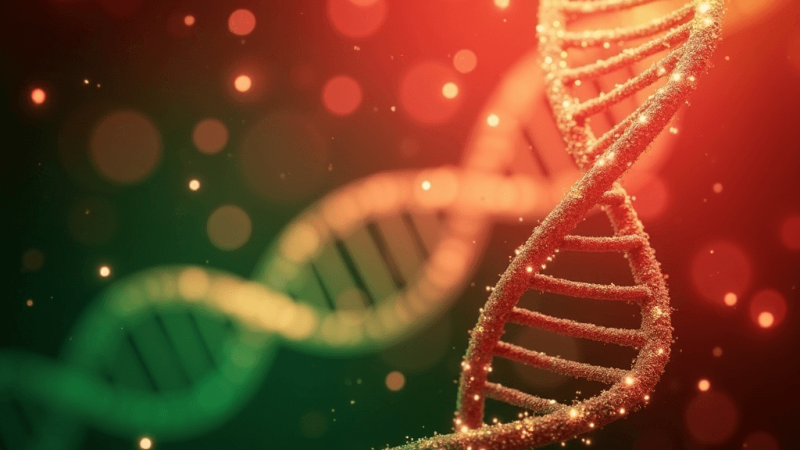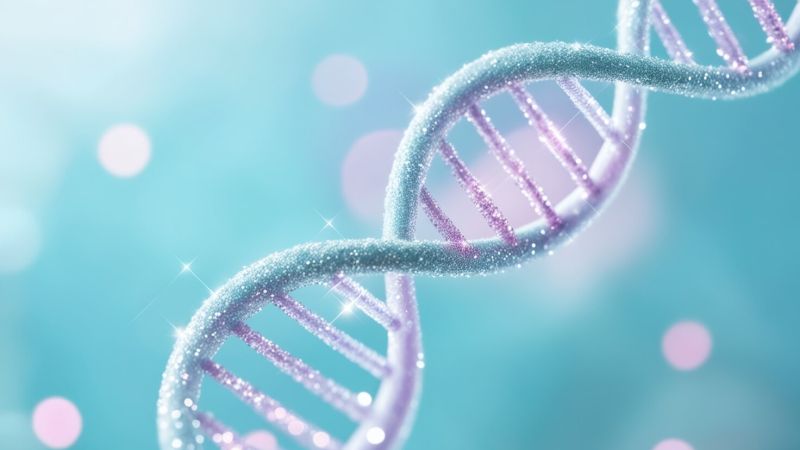
The Complete Creatine Guide: How to Optimize Strength and Longevity
Creatine is widely celebrated for its muscle-building benefits, making it a staple supplement for athletes and fitness enthusiasts aiming to enhance their strength and physique.
Beyond its well-known benefits in promoting muscle mass and performance, creatine offers a range of lesser-known advantages that extend far beyond the gym.
From supporting cognitive health to improving metabolic function, creatine’s versatility makes it a valuable addition to various wellness routines.
Growing research also suggests that creatine can help lower the risk of chronic diseases1, adding another layer of appeal for those focused on long-term health.
However, despite its extensive benefits, creatine is often surrounded by misconceptions that may deter potential users.
In this article, we explore…
- How creatine can not only boost muscle growth but also enhance memory, brain function, heart health, and overall well-being.
- Can creatine cause weight gain and hair loss? Debunking these common misconceptions with scientific evidence and more.
- Our top-recommended creatine product, chosen for its excellent safety profile and proven effectiveness, to help you make an informed and confident choice in your supplementation.

What is Creatine?
Creatine is a naturally occurring compound found primarily in muscle cells2, where it plays a crucial role in energy production during high-intensity exercise.
Widely recognized and utilized in the fitness and bodybuilding communities, creatine has gained popularity for its ability to enhance athletic performance and muscle growth.
It is a nitrogenous organic acid that consists of three amino acids: arginine, glycine, and methionine3.
In the body, creatine is synthesized primarily in the liver and kidneys and is also obtained through dietary sources such as meat and fish.
It also exists in two forms: free creatine and phosphocreatine, the latter is crucial for the rapid regeneration of adenosine triphosphate (ATP), the primary energy carrier in cells.
How Creatine Works in the Body

Creatine functions by boosting the levels of phosphocreatine in muscle tissues.
Phosphocreatine plays a crucial role in the rapid regeneration of adenosine triphosphate (ATP)4, which is the primary energy carrier in cells.
During intense physical activity, your muscles rely on ATP to fuel contractions. However, ATP stores deplete quickly during exercise, leading to fatigue.
By increasing phosphocreatine stores, creatine supplementation helps your body replenish ATP more efficiently.
This allows athletes to sustain higher levels of muscular output for longer periods, delaying the onset of fatigue and significantly improving overall performance.
Essentially, creatine gives your muscles the ability to work harder and recover faster during high-intensity exercise.
Moreover, creatine supplementation has been shown to enhance muscle cell volume.
This occurs because creatine draws water into the muscle cells, leading to a phenomenon known as cell volumization.
This not only contributes to muscle growth and performance but also helps create an environment conducive to muscle repair and recovery.
Additionally, some studies suggest that creatine might influence the activity of satellite cells, which are involved in muscle repair and growth.
By activating these cells, creatine can further aid in muscle recovery and hypertrophy.
The combination of these effects makes creatine a powerful supplement for those looking to improve their athletic performance and muscle health.
How Creatine Can Boost Your Muscle Gains

Creatine supplementation offers several benefits specifically targeted toward muscle health and performance.
Firstly, it enhances muscle mass and strength by promoting muscle protein synthesis.5
This process is facilitated by creatine’s ability to increase the availability of ATP, the energy currency of the cell, which is crucial for protein synthesis and muscle growth.
This makes creatine particularly advantageous for athletes and individuals engaged in resistance training, as it supports the development of lean muscle mass and overall strength.
Secondly, creatine improves athletic performance by increasing phosphocreatine stores in muscles.6
Phosphocreatine serves as a rapid reserve for ATP production during high-intensity, short-duration exercises.
By boosting these stores, creatine allows the body to generate energy more efficiently during intense exercise, enhancing performance in activities requiring short bursts of power, such as sprinting and weightlifting.
Furthermore, creatine aids in recovery post-exercise by reducing muscle damage and inflammation.
It acts as an osmolyte7, helping to maintain cellular hydration and integrity, which can mitigate the extent of muscle damage caused by strenuous activities.
Creatine’s anti-inflammatory properties also play a role in speeding up recovery times between workouts, allowing athletes to train more consistently and effectively.
A study published in the Journal of the International Society of Sports Nutrition discovered that creatine supplementation can enhance muscle mass and strength8, improve high-intensity exercise performance, and reduce muscle damage and inflammation post-exercise.
These combined effects make creatine an invaluable supplement for athletes and individuals seeking to optimize their muscle health and exercise performance.
7 Surprising Benefits of Creatine Beyond Muscle Gain

Creatine supplementation has shown benefits beyond muscle gain and performance enhancement:
Enhanced Cognitive Function
Research shows that creatine supplementation may enhance short-term memory and cognitive processing9, particularly under stressful conditions.
The mechanism behind creatine’s cognitive benefits lies in its role in cellular energy metabolism.
Creatine is crucial for the production of adenosine triphosphate (ATP), the primary energy carrier in cells.
In the brain, ATP is essential for various cognitive processes, including memory, attention, and learning. By increasing the availability of ATP, creatine supplementation can enhance brain energy metabolism, leading to improved cognitive function.
However, under stressful conditions, the brain’s energy demand increases.
Stress can deplete ATP levels, impairing cognitive performance. Creatine helps replenish ATP stores, thereby supporting cognitive functions even during stress.
Additionally, creatine has neuroprotective properties, reducing oxidative stress and inflammation in the brain, which can further enhance cognitive resilience.
One notable study published in the Psychopharmacology journal found that creatine supplementation significantly improved cognitive tasks involving memory and intelligence10, especially under stress.
Of the 281 participants, those who took creatine supplementation showed enhanced short-term memory and improved intelligence/reasoning abilities.
Another study in the Journal of Clinical Psychopharmacology demonstrated that creatine supplementation helped reduce mental fatigue and enhanced working memory11 during demanding mental tasks.
This is because creatine increases brain creatine stores, which may positively impact cognition and memory, especially in aging adults or during periods of metabolic stress such as sleep deprivation
Neuroprotection
Creatine has neuroprotective properties that may help reduce the risk of neurodegenerative diseases such as Parkinson’s and Alzheimer’s12.
This is due to creatine’s role in maintaining ATP levels in neurons, which ensures an adequate energy supply during periods of high demand.
This is particularly important in neurodegenerative conditions where energy deficits are common.
Additionally, creatine exhibits antioxidant effects, reducing oxidative stress and free radical damage in the brain, which are major contributors to neuronal damage and death.
Furthermore, creatine supports mitochondrial function, enhancing its ability to produce energy and reducing the production of reactive oxygen species (ROS).
Improved mitochondrial function leads to better cellular energy management and reduced apoptosis (programmed cell death) of neurons.
Creatine also inhibits apoptotic pathways, protecting neurons from programmed cell death, which is crucial in conditions like Parkinson’s and Alzheimer’s, where excessive apoptosis contributes to neuronal loss.
In fact, a study published in the Journal of Nutrients showed that creatine supplementation can support improved mitochondrial function, delay the onset of motor symptoms, and reduce the severity of neurodegeneration in models of Parkinson’s disease.13
Similarly, in models of Alzheimer’s disease, creatine reduces amyloid plaque formation and tau pathology, preserving synaptic function and cognitive performance.
These findings suggest that creatine supplementation holds promise for reducing the risk and progression of neurodegenerative diseases by enhancing ATP production, reducing oxidative stress, supporting mitochondrial function, and inhibiting apoptosis, thereby maintaining neuronal health and function.
Stress and Fatigue Reduction
Creatine’s role in enhancing ATP regeneration is crucial for reducing mental fatigue and supporting recovery during periods of stress or sleep deprivation.14
ATP (adenosine triphosphate) is the primary energy currency of the cell, and maintaining adequate ATP levels is essential for proper brain function.
During periods of high cognitive demand, stress, or sleep deprivation, the brain’s energy requirements increase significantly.
Creatine supplementation boosts the phosphocreatine system, which rapidly regenerates ATP from ADP (adenosine diphosphate), ensuring a continuous supply of energy to neurons.
This enhanced ATP regeneration helps maintain optimal brain function, reducing the onset of mental fatigue and supporting cognitive performance under challenging conditions.
Additionally, creatine acts as a buffer against cellular energy deficits, which are common during prolonged periods of stress or lack of sleep.
By stabilizing cellular energy levels, creatine helps maintain neuronal integrity and function, preventing the cognitive decline associated with energy shortages.
The neuroprotective effects of creatine are further supported by its ability to reduce oxidative stress and inflammation, both of which can impair cognitive function and contribute to mental fatigue.
A study published in the Journal of Scientific Reports showed that creatine supplementation can help improve cognitive performance and reduce the effects of sleep deprivation in mice by enhancing brain energy metabolism.15
This is due to creatine inducing positive changes in several key indicators of brain metabolism and energy status, such as PCr/Pi, ATP, and tCr/tNAA levels, while also preventing a drop in pH.
This helps mitigate the adverse effects of sleep deprivation and stress on cognitive function by supporting ATP regeneration and overall brain energy homeostasis.
Therefore, by ensuring a steady supply of energy to the brain, creatine helps maintain cognitive performance and protect against the detrimental effects of prolonged stress and lack of sleep.
Prevention of Sarcopenia
In older adults, creatine supplementation may play a significant role in preserving muscle mass and strength, preventing the effects of age-related muscle loss, also known as sarcopenia.16
Sarcopenia is characterized by the progressive loss of muscle mass and function, which can lead to reduced mobility, increased risk of falls, and overall decline in quality of life.
Creatine combats sarcopenia by enhancing muscle energy metabolism.
Creatine is stored in muscles as phosphocreatine, which serves as a rapid reserve to regenerate ATP during high-intensity activities.
By increasing the availability of phosphocreatine, creatine supplementation ensures a continuous supply of ATP, supporting sustained muscle contractions and reducing muscle fatigue.
Furthermore, creatine has been shown to enhance the anabolic response to resistance training, which is crucial for muscle maintenance and growth in older adults.
It promotes the synthesis of muscle proteins and inhibits their degradation, thereby contributing to increased muscle mass and strength.
This effect is particularly beneficial for older adults, who often experience a decline in the body’s ability to build and repair muscle tissue.
A study published in the journal Medicine & Science in Sports & Exercise found that older women who were supplemented with creatine and engaged in resistance training experienced significant improvements in muscle mass and strength17 compared to those who did not supplement with creatine.
After 24 weeks of the study, these women show improvements in both upper-body and lower-body strength.
This shows that creatine can enhance the effects of resistance training, making it a valuable intervention for older adults seeking to preserve muscle health.
This, in turn, helps mitigate the effects of age-related muscle loss, improving mobility, reducing the risk of falls, and enhancing overall quality of life.
Improved Cardiovascular Health
Creatine can improve heart function and vascular health18, potentially reducing the risk of cardiovascular diseases.
This is because creatine can boost cellular energy metabolism.
Creatine is stored in tissues, including the heart, as phosphocreatine, which serves as a rapid reserve to regenerate ATP during periods of high energy demand.
By increasing the availability of phosphocreatine, creatine supplementation helps maintain ATP levels, thereby supporting the energy needs of the heart and improving its function.
This can lead to enhanced myocardial performance, particularly during stress or high-intensity activities, and may also contribute to the protection of cardiac cells from ischemic damage.
Moreover, creatine has been shown to have beneficial effects on endothelial function, which is critical for vascular health.19
Improved endothelial function helps maintain vascular tone, reduces oxidative stress, and inhibits the formation of atherosclerotic plaques, thereby lowering the risk of cardiovascular diseases such as hypertension and coronary artery disease.
These cardiovascular benefits are attributed to creatine’s ability to modulate nitric oxide production and reduce inflammatory markers, contributing to healthier blood vessels.
A study published in the American Journal of Physiology-Heart and Circulatory Physiology showed that creatine supplementation in an animal model of heart failure preserved ATP levels, improved heart function, and reduced the extent of cardiac remodeling.20
It supports cardiac energy metabolism and protect against heart failure.
Moreiver, it contributes to better myocardial performance, reduced oxidative stress, and improved vascular tone, potentially lowering the risk of cardiovascular diseases.
Improved Glucose Metabolism
Creatine may also enhance insulin sensitivity and glucose uptake by muscles21, offering potential benefits for individuals with diabetes or those at risk.
This is due to its ability to increase the availability of phosphocreatine, which helps regenerate ATP during periods of high energy demand.
The boost in cellular energy can enhance the activity of glucose transporters, such as GLUT-4, on muscle cells, promoting increased glucose uptake from the bloodstream.
Additionally, creatine has been shown to improve insulin signaling by modulating key pathways involved in glucose metabolism.
For example, creatine can enhance the activation of the protein kinase B (Akt) pathway, which plays a critical role in the translocation of GLUT-4 to the cell surface, facilitating glucose uptake.
Improved insulin signaling and increased GLUT-4 activity result in better glucose control and increased glycogen storage in muscle tissues, which is particularly beneficial for individuals with insulin resistance or type 2 diabetes.
A study published in the Journal of Clinical Endocrinology & Metabolism found that creatine supplementation, combined with exercise, significantly improved glucose tolerance and insulin sensitivity in healthy individuals.22
Participants received either creatine (5g/day) or placebo for 12 weeks.
Those taking creatine showed a significant decrease in glycosylated hemoglobin (HbA1c) levels compared to those on placebo.
The creatine group also had lower blood sugar levels during a meal test and improved GLUT-4 protein movement, which suggests better insulin sensitivity.
Moreover, creatine can enhance insulin sensitivity and glucose uptake by muscles through its effects on cellular energy metabolism and insulin signaling pathways.
These improvements can help regulate blood sugar levels and support better glucose control, making creatine supplementation beneficial for individuals with diabetes or those at risk of developing the condition.
Protection Against Eye Diseases
Emerging evidence suggests that creatine may also play a protective role against certain eye diseases, such as age-related macular degeneration (AMD).23
This is because creatine can enhance cellular energy metabolism and reduce oxidative stress, both of which are crucial in maintaining retinal health.
Creatine helps in the regeneration of ATP, the primary energy currency of cells, which is essential for the high-energy demands of retinal cells.
By maintaining ATP levels, creatine supports the metabolic needs of retinal cells, thereby preserving their function and viability.
Additionally, creatine exhibits antioxidant properties that can mitigate oxidative damage,24 a key factor in the progression of AMD.
Oxidative stress results from an imbalance between free radicals and antioxidants in the body, leading to cellular damage.
In the retina, oxidative stress can damage photoreceptor cells and the retinal pigment epithelium, contributing to the development of AMD25. By reducing oxidative stress, creatine helps protect these critical cells from damage.
Uncovering the Truth About Creatine

There are numerous misconceptions and myths surrounding creatine. Today, I’m here to debunk them using insights from scientific studies and literature.
Does Creatine Lead to Water Retention?
The notion that creatine supplementation leads to water retention primarily stems from early research that observed a rise in total body water (TBW) when subjects consumed 20 grams of creatine per day for six days.26
These initial studies indicated that creatine could cause short-term water retention. For example, research showed that three days of creatine use increased TBW27, extracellular water (ECW), and intracellular water (ICW).
Creatine acts as an osmotic agent, meaning it draws water into cells. When creatine is transported into muscles through a sodium-dependent mechanism, water follows to maintain cellular balance.
Despite this, the action of sodium-potassium pumps in cells likely prevents significant increases in intracellular sodium levels due to creatine supplementation. This suggests that any water retention from creatine is temporary or minimal.
Longer-term studies (5-10 weeks) have largely shown no significant increases in TBW with creatine use.
For instance, resistance-trained men who took creatine (0.3 g/kg lean body mass/day for 7 days, followed by 0.075 g/kg lean body mass/day for 28 days) did not show significant changes in ICW, ECW, or TBW.
Other studies with similar creatine dosing also found no significant increase in TBW for both men and women.
However, a study revealed that while creatine supplementation increased muscle creatine content and body mass, it did not significantly alter ICW or ECW volumes.28
Additionally, it was found that combining creatine with resistance exercise for eight weeks led to a significant increase in TBW and ICW volumes compared to a placebo group.
Importantly, the ratio of skeletal muscle mass to ICW remained stable in both groups,29 indicating that the retained water supported muscle protein synthesis and contributed to muscle growth over time.
In conclusion, while short-term creatine supplementation may cause a temporary increase in water retention, long-term use does not appear to lead to significant water retention.
The initial water weight gain is typically transient and part of the process of enhancing muscle creatine content, which ultimately supports muscle growth and performance.
Is Creatine an Anabolic Steroid?
No, creatine is not an anabolic steroid.
Anabolic steroids are synthetic versions of testosterone, a hormone naturally produced in both men and women.
These steroids are used to enhance muscle mass and strength by increasing muscle protein synthesis.30 They work by entering muscle cells, binding to androgen receptors, and promoting the expression of muscle-specific genes.
Creatine, on the other hand, is a compound that the body naturally converts into phosphocreatine, which is then used to produce adenosine triphosphate (ATP), the primary energy carrier in cells31.
Supplementing with creatine increases the availability of phosphocreatine in muscles, which helps generate more ATP during high-intensity, anaerobic activities. This boost in ATP can enhance muscle power, improve exercise performance, and support muscle growth over time32.
While both anabolic steroids and creatine can lead to improved muscle performance and growth, their mechanisms and legal statuses are distinct.
Anabolic steroids are classified as controlled substances and are regulated by the Food and Drug Administration (FDA) and the Drug Enforcement Administration (DEA). They require a prescription for legal use due to their potential for misuse and significant side effects.
Creatine, in contrast, is considered a dietary supplement. It is regulated under the Dietary Supplement Health and Education Act of 1994 (DSHEA) by the FDA for Good Manufacturing Practices (GMP).
Unlike anabolic steroids, creatine is legal to purchase and use without a prescription, and it does not carry the same health risks.
Does Creatine Cause Kidney Damage?
In muscles, creatine and phosphocreatine break down into creatinine, which is then filtered out of the blood by the kidneys and excreted in urine.
Blood creatinine levels are often used as an indicator of kidney function. However, these levels can be influenced by muscle mass, diet, and creatine supplementation.
The myth likely stems from the belief that higher levels of creatine or creatinine due to supplementation could overwhelm the kidneys, leading to damage.
In reality, temporary increases in blood or urinary creatinine from creatine use do not indicate kidney dysfunction. It is important to consider these factors when evaluating kidney health in individuals consuming creatine or a high-meat diet.
In 1998, a case study reported kidney health concerns in a young male with pre-existing kidney disease33 who started taking creatine supplements.
The authors suggested that his kidney function was deteriorating based on increased blood creatinine levels, but they did not account for the known effects of creatine intake on these levels or the patient’s medical history.
Since then, numerous studies have examined creatine’s impact on kidney function. The majority of research, including multiple controlled trials, has found no adverse effects on kidney health from recommended creatine dosages in healthy individuals.
For example, a review by Persky and Rawson found no significant changes in serum creatinine levels across several studies34. A few case reports have noted kidney issues in individuals taking creatine, but these cases often involved pre-existing conditions, medication use, or extremely high doses of creatine.
Overall, the evidence does not support the notion that creatine supplementation harms kidney function in healthy individuals. After decades of research and widespread use among athletes, no link between creatine and kidney damage has been established.
However, it is always wise to consult a healthcare professional before starting any new supplement regimen.
Does Creatine Cause Hair Loss or Baldness?
The idea that creatine supplementation may lead to hair loss or baldness primarily comes from a study that involved college-aged male rugby players who took 25 grams of creatine daily for seven days, followed by 5 grams daily for another 14 days.35
The researchers observed a 56% increase in serum dihydrotestosterone (DHT) levels after the initial week and a 40% increase above baseline after the maintenance period.
In contrast, the placebo group, who took glucose instead, did not experience such changes. Since DHT is linked to some types of hair loss, the study led to speculation that creatine might contribute to baldness.36
However, it’s important to note that these findings have not been replicated, and intense exercise itself can also raise androgenic hormone levels.
DHT, a derivative of testosterone formed by the enzyme 5-alpha-reductase36, can bind to androgen receptors in hair follicles and potentially cause them to shrink, leading to hair loss in susceptible individuals.
In the study, total testosterone levels did not increase in the participants, and free testosterone was not measured.
The increase in DHT and the DHT ratio remained within normal clinical ranges. Moreover, the baseline DHT levels were lower in the creatine group compared to the placebo group, making the reported increases less alarming.
This small increase in DHT combined with a slight decrease in the placebo group’s DHT explained the statistically significant result.
No other studies have reported a link between creatine supplementation and hair loss in humans.
In fact, 12 additional studies have explored creatine’s effects on testosterone levels, with doses ranging from 3 to 25 grams per day over periods from six days to 12 weeks.
Only two of these studies found minor increases in total testosterone37, which were not physiologically significant.
The other studies reported no changes in testosterone levels, including free testosterone, which is necessary for DHT production.
Does Creatine Cause Dehydration and Muscle Cramping?
There is a common concern that creatine supplementation might lead to dehydration and muscle cramping.
This belief stems from the early 2000s when limited data and speculation led the American College of Sports Medicine (ACSM) to recommend against creatine use for individuals engaged in intense exercise or working out in hot conditions.38
The theory behind this recommendation was that creatine, being osmotically active and primarily stored in skeletal muscle, might shift fluid balance in the body39, causing more water to be retained within muscle cells.
This, in turn, was thought to potentially lead to dehydration, electrolyte imbalance, and muscle cramps during intense sweating or heat exposure.
During the initial loading phase of creatine supplementation (about 20 grams per day for 5-7 days), an increase in body mass of 1-3 kg is often observed40, largely due to water retention.
Some anecdotal evidence supports the perception of adverse effects such as cramping.
For instance, a survey of 219 athletes found that 38% of the 90 creatine users reported negative effects, including cramping41.
Similar results were noted in another study involving NCAA Division 1 baseball and football players, where 25% reported muscle cramping and 13.5% reported symptoms of dehydration.42
However, these studies did not control for other supplement use or the specific dosages of creatine consumed, with 91% of participants exceeding the recommended maintenance dose of 5 grams per day.
Contrary to these self-reported surveys, experimental and clinical research provides a different perspective.
A study monitored injury rates in NCAA Division IA collegiate football players over a football season. In this study, participants chose either creatine (0.3 g/kg/day for 5 days, followed by 0.03 g/kg/day for 115 days) or a sports drink placebo.
The results showed that creatine users experienced significantly fewer cramps, heat illnesses, dehydration, muscle tightness, muscle strains, and total injuries compared to non-users43.
Moreover, a clinical study involving hemodialysis patients, who frequently experience muscle cramping, showed that taking 12 grams of creatine before dialysis sessions reduced the frequency of muscle cramps by 60%44
Overall, the evidence suggests that while initial concerns about creatine leading to dehydration and muscle cramping were based on theoretical and anecdotal reports, experimental and clinical studies have not supported these claims.
Creatine appears to be safe when used as recommended and does not cause dehydration or muscle cramping.
Does Creatine Increase Fat Mass?
There’s a common belief among some people that creatine supplementation might lead to an increase in fat mass, possibly due to the overall increase in body mass that some users experience.
However, scientific studies, including randomized controlled trials, have not supported this claim.
Short-term studies lasting from one week to three months have consistently shown that creatine supplementation does not increase fat mass.
For instance, a study involving young and older adults found that while creatine supplementation increased fat-free mass over seven days, it did not affect fat mass.45
Similar findings were reported in swimmers46 over three weeks and in recreationally active females undergoing high-intensity interval training.
Additionally, studies involving resistance training over short periods also showed no increase in fat mass with creatine use.47
Longer-term studies, extending up to two years, have reinforced these findings.
For example, a 12-week study involving resistance-trained males found that while lean body mass and muscle fiber size increased, fat mass remained unchanged48. Another 12-week study in older males (~70 years) reported no significant changes in fat mass compared to a placebo group.
Studies on older females over 24 weeks and older adults (50-71 years) over 32 weeks also showed no increase in fat mass with creatine supplementation.49
In some cases, a reduction in fat mass was even observed, such as in children with acute lymphoblastic leukemia and older adults participating in resistance training.
A systematic review and meta-analysis further examined the effects of creatine supplementation in conjunction with resistance training on fat mass in older adults. The analysis included 19 studies with a total of 609 participants.
The results indicated that participants supplementing with creatine experienced a greater reduction in body fat percentage compared to those on a placebo50, though the absolute fat mass loss was not significantly different.
Is Creatine Only Effective for Males?
The effectiveness of creatine supplementation is not limited to males; it can be beneficial for females as well.
Research has shown that creatine kinetics can differ between men and women, with women51 potentially having higher intramuscular creatine levels due to lower muscle mass.
This higher baseline level may explain why some studies report less pronounced performance improvements in women compared to men.
Hormonal fluctuations throughout different stages of a woman’s reproductive life, such as menstruation, pregnancy, postpartum, perimenopause, and postmenopause, can affect creatine synthesis and metabolism.
Estrogen and progesterone, in particular, influence the activity of creatine kinase,52 an enzyme crucial for creatine’s role in energy metabolism.
These hormonal changes suggest that creatine supplementation could be particularly beneficial during these stages, enhancing muscle function and overall physical performance.
Animal studies have shown that creatine supplementation during pregnancy can protect against fetal death and organ damage caused by low oxygen levels.
It also supports the mother’s creatine pool, which can be depleted during pregnancy, potentially reducing risks associated with low birth weight and preterm birth.
While human studies are still needed, these findings indicate that creatine could be a safe, low-cost nutritional intervention for pregnant women, especially those who do not consume meat, which is a primary dietary source of creatine.
Regarding brain health, women generally have lower creatine levels in the brain53, which has been linked to higher rates of depression, especially during reproductive years.
Supplementing with creatine may enhance brain creatine levels54, potentially alleviating symptoms of depression and improving recovery from traumatic brain injuries.
This is particularly relevant given that depression rates in women are about twice as high as in men during their reproductive years.
Studies on younger women have demonstrated that creatine supplementation can significantly increase muscle mass and strength when combined with resistance training.55
For instance, creatine has been shown to improve performance in female athletes, such as soccer players56, and enhance exercise capacity in strength-trained women.
In postmenopausal women, creatine combined with resistance training has been shown to improve muscle mass, strength, and functional performance.57
It also appears to help maintain bone mineral density when paired with resistance training, which is crucial for reducing the risk of fractures.
Even without exercise, creatine supplementation has been associated with improved muscle function58 and physical performance in older women.
In summary, creatine is not just effective for males; it offers significant benefits for females as well, particularly when combined with resistance training.
Is Creatine Beneficial for Older Adults?
Recent research highlights the potential benefits of creatine supplementation in various clinical conditions, including age-related sarcopenia.
Sarcopenia involves the progressive loss of muscle mass, strength, and functionality59, leading to increased risks of falls, fractures, physical disabilities, and mortality.
While resistance training is crucial for treating sarcopenia, studies suggest that combining it with creatine supplementation may enhance muscle growth and functionality60, helping to mitigate the effects of sarcopenia.
In older adults, creatine supplementation has been shown to improve muscle strength, functionality, and daily activities, as well as delay fatigue.61
However, creatine alone, without accompanying resistance training, is generally ineffective in significantly increasing muscle strength and functional performance62.
While some studies report minor improvements in muscle fatigue with creatine alone, the majority do not show significant gains in muscle mass without resistance training.
Evidence strongly supports that creatine enhances the hypertrophic response63 to resistance training in both young and older adults.
This synergistic effect is likely due to creatine’s ability to increase training volume and intensity, impacting muscle protein synthesis, growth factors, satellite cells, inflammation, and oxidative stress.
Consequently, combining creatine with resistance training leads to greater muscle adaptations.
Emerging research also indicates that creatine supplementation can benefit bone health in older adults.
Studies have shown that older men who were supplemented with creatine while engaging in resistance training experienced increased bone mineral content and reduced bone resorption.64
Similarly, postmenopausal women who supplemented creatine for 52 weeks and undertook resistance training had slower rates of bone mineral loss in the hip region.65
However, creatine alone, without resistance training, did not significantly improve bone mass or geometry, reinforcing the importance of combining creatine with exercise.
In summary, for older adults, the best results from creatine supplementation are achieved when it is combined with resistance training.
How To Choose The Right Creatine Supplement

Choosing the right creatine supplement is more than just picking any off the shelf.
Quality matters!
When you’re looking for a creatine supplement, purity and safety should be top priorities.
Check those labels carefully to ensure you’re getting a product free from contaminants.
Look for specifics like creatine monohydrate and third-party certifications from trusted organizations.
It’s also important to read consumer reviews to get real-world feedback on effectiveness and any possible side effects.
Your body deserves the best, so choose wisely for your health and fitness goals.
Creatine+ by Jinfiniti: The Best Creatine For Men and Women

Here at Jinfiniti, we created Creatine+ to provide you with a pure, safe, and effective creatine supplement, not only for your muscle and athletic needs but also for your overall health.
We offer the first and only creatine product with ATP, the primary energy source for cellular processes.
Creatine+ contains creatine monohydrate and disodium ATP that work synergistically to provide many critical health benefits and revitalize your cells and body:
- Two high-purity and natural ingredients
- Provide cellular energy currency: ATP
- Store and release ATP to power your muscles as needed
- Novel neurotransmitter for better brain function
- Boost muscle mass, the most important longevity organ
This unique formulation not only harnesses the benefits of creatine for boosting muscle strength and growth but also supports ATP production, ensuring a consistent energy supply for muscles during intense workouts.
Together, they offer synergistic benefits that not only enhance athletic performance but also contribute to overall health and vitality.
1. Enhanced Muscle Performance
ATP is the direct source of energy for muscle contractions, while creatine monohydrate boosts the production and replenishment of ATP.
When used together, they can significantly increase the availability of ATP, allowing for prolonged high-intensity exercise and improved performance during short bursts of activity.
The increased ATP production facilitated by creatine monohydrate helps delay the onset of muscle fatigue.
This means athletes can train harder and longer before experiencing exhaustion, leading to more effective workouts and better performance.
2. Improved Muscle Growth and Recovery
Creatine monohydrate is well-known for its ability to enhance muscle protein synthesis, which is crucial for muscle growth.
By ensuring a steady supply of ATP, muscles can contract more forcefully and for longer periods, stimulating greater muscle hypertrophy.
After intense exercise, ATP and creatine help speed up muscle recovery. ATP provides the energy needed for repair processes, while creatine aids in reducing muscle damage and inflammation.
This results in shorter recovery times between workouts and reduced muscle soreness.
3. Enhanced Cognitive Function
ATP is essential for brain function, providing the energy required for cognitive processes. Creatine has been shown to support brain energy metabolism, enhancing mental clarity, focus, and overall cognitive performance.
This combination can be particularly beneficial in stressful situations or periods of sleep deprivation.
Both ATP and creatine have neuroprotective properties. They help protect brain cells from damage and support overall brain health, potentially reducing the risk of neurodegenerative diseases.
4. Better Overall Health
ATP is involved in nearly every metabolic process in the body, and creatine supports ATP production.
This combination ensures that cells function optimally, improving nutrient absorption, waste removal, and overall cell health.
ATP powers immune cells, helping the body effectively fight off infections and diseases. Creatine supports ATP availability, thus enhancing the immune response and contributing to better overall health.
5. Chronic Disease Prevention
Optimal levels of ATP and creatine can help in the prevention of chronic diseases.
They support cardiovascular health, improve insulin sensitivity, and protect against muscle wasting and cognitive decline, thereby reducing the risk of conditions such as heart disease, diabetes, and neurodegenerative disorders.
Others may offer creatine or ATP separately, but Jinfiniti’s Creatine+ combines these two essential components for maximum effectiveness.
Not to mention, it’s convenient and price-saving.
⇒ Learn more about Creatine+ here
How to Use Creatine+

To maximize the benefits of Creatine+, mix one level scoop of the powder with 5-10 oz of room temperature water and consume, with or without food.
For enhanced results, it is strongly recommended to combine Creatine+ with Vitality ↑® NAD+ Booster.
This combination supports the optimization of NAD levels, crucial for ATP production by the mitochondria.
ATP is essential for cellular energy, making this synergy beneficial for improving energy levels, muscle function, and overall performance during physical activities.
For optimal results, use Creatine+ and Vitality ↑® NAD+ Booster together.
Creatine+ is formulated to boost muscle growth and energy by increasing ATP levels, vital for cellular energy. It provides ATP directly and stores it through creatine.
Vitality ↑® NAD+ Booster focuses on optimizing NAD levels, enhancing ATP production from food.
Together, these supplements work synergistically to optimize your health and longevity.
Our Money-Back Guarantee
If you don’t feel improvements in your energy, health, or muscle gain after taking Creatine+, just send us a message within 60 days, and we will gladly refund your purchase.
Please note that tests are non-refundable.
Referenced Sources:
- https://www.ncbi.nlm.nih.gov/pmc/articles/PMC7910963/ ↩︎
- https://www.ncbi.nlm.nih.gov/pmc/articles/PMC3407788/ ↩︎
- https://pubchem.ncbi.nlm.nih.gov/compound/Creatine ↩︎
- https://pubchem.ncbi.nlm.nih.gov/compound/Phosphocreatine ↩︎
- https://pubmed.ncbi.nlm.nih.gov/4407046/ ↩︎
- https://www.ncbi.nlm.nih.gov/pmc/articles/PMC1319235/ ↩︎
- https://www.ncbi.nlm.nih.gov/pmc/articles/PMC1890352/ ↩︎
- https://www.ncbi.nlm.nih.gov/pmc/articles/PMC2048496/ ↩︎
- https://www.ncbi.nlm.nih.gov/pmc/articles/PMC6093191/ ↩︎
- https://www.ncbi.nlm.nih.gov/pmc/articles/PMC6093191/ ↩︎
- https://www.ncbi.nlm.nih.gov/pmc/articles/PMC10721691/ ↩︎
- https://www.ncbi.nlm.nih.gov/pmc/articles/PMC4304302/ ↩︎
- https://www.ncbi.nlm.nih.gov/pmc/articles/PMC8838971/ ↩︎
- https://www.ncbi.nlm.nih.gov/pmc/articles/PMC8912287/ ↩︎
- https://www.nature.com/articles/s41598-024-54249-9 ↩︎
- https://www.ncbi.nlm.nih.gov/pmc/articles/PMC6518405/ ↩︎
- https://www.ncbi.nlm.nih.gov/pmc/articles/PMC8619193/ ↩︎
- https://www.ncbi.nlm.nih.gov/pmc/articles/PMC8067763/ ↩︎
- https://www.ncbi.nlm.nih.gov/pmc/articles/PMC7999364/ ↩︎
- https://www.ncbi.nlm.nih.gov/pmc/articles/PMC8067763/ ↩︎
- https://www.ncbi.nlm.nih.gov/pmc/articles/PMC7915263/ ↩︎
- https://www.researchgate.net/publication/46821061 ↩︎
- https://patents.google.com/patent/US20090005450A1/en ↩︎
- https://www.ncbi.nlm.nih.gov/pmc/articles/PMC8000194/ ↩︎
- https://www.ncbi.nlm.nih.gov/pmc/articles/PMC10328284/ ↩︎
- https://jissn.biomedcentral.com/articles/10.1186/s12970-021-00412-w#ref-CR35 ↩︎
- https://jissn.biomedcentral.com/articles/10.1186/s12970-021-00412-w#ref-CR37 ↩︎
- https://jissn.biomedcentral.com/articles/10.1186/s12970-021-00412-w#ref-CR40 ↩︎
- https://jissn.biomedcentral.com/articles/10.1186/s12970-021-00412-w#ref-CR46 ↩︎
- https://jissn.biomedcentral.com/articles/10.1186/s12970-021-00412-w#ref-CR47 ↩︎
- https://jissn.biomedcentral.com/articles/10.1186/s12970-021-00412-w#ref-CR1 ↩︎
- https://jissn.biomedcentral.com/articles/10.1186/s12970-021-00412-w#ref-CR2 ↩︎
- https://jissn.biomedcentral.com/articles/10.1186/s12970-021-00412-w#ref-CR1 ↩︎
- https://jissn.biomedcentral.com/articles/10.1186/s12970-021-00412-w#ref-CR50 ↩︎
- https://jissn.biomedcentral.com/articles/10.1186/s12970-021-00412-w#ref-CR61 ↩︎
- https://jissn.biomedcentral.com/articles/10.1186/s12970-021-00412-w#ref-CR62 ↩︎
- https://jissn.biomedcentral.com/articles/10.1186/s12970-021-00412-w#ref-CR63 ↩︎
- https://jissn.biomedcentral.com/articles/10.1186/s12970-021-00412-w#ref-CR65 ↩︎
- https://jissn.biomedcentral.com/articles/10.1186/s12970-021-00412-w#ref-CR74 ↩︎
- https://jissn.biomedcentral.com/articles/10.1186/s12970-021-00412-w#ref-CR38 ↩︎
- https://jissn.biomedcentral.com/articles/10.1186/s12970-021-00412-w#ref-CR75 ↩︎
- https://jissn.biomedcentral.com/articles/10.1186/s12970-021-00412-w#ref-CR77 ↩︎
- https://jissn.biomedcentral.com/articles/10.1186/s12970-021-00412-w#ref-CR77 ↩︎
- https://jissn.biomedcentral.com/articles/10.1186/s12970-021-00412-w#ref-CR78 ↩︎
- https://jissn.biomedcentral.com/articles/10.1186/s12970-021-00412-w#ref-CR79 ↩︎
- https://jissn.biomedcentral.com/articles/10.1186/s12970-021-00412-w#ref-CR86 ↩︎
- https://jissn.biomedcentral.com/articles/10.1186/s12970-021-00412-w#ref-CR88 ↩︎
- https://jissn.biomedcentral.com/articles/10.1186/s12970-021-00412-w#ref-CR89 ↩︎
- https://jissn.biomedcentral.com/articles/10.1186/s12970-021-00412-w#ref-CR94 ↩︎
- https://jissn.biomedcentral.com/articles/10.1186/s12970-021-00412-w#ref-CR95 ↩︎
- https://jissn.biomedcentral.com/articles/10.1186/s12970-021-00412-w#ref-CR100 ↩︎
- https://jissn.biomedcentral.com/articles/10.1186/s12970-021-00412-w#ref-CR158 ↩︎
- https://jissn.biomedcentral.com/articles/10.1186/s12970-021-00412-w#ref-CR1 ↩︎
- https://jissn.biomedcentral.com/articles/10.1186/s12970-021-00412-w#ref-CR170 ↩︎
- https://jissn.biomedcentral.com/articles/10.1186/s12970-021-00412-w#ref-CR175 ↩︎
- https://jissn.biomedcentral.com/articles/10.1186/s12970-021-00412-w#ref-CR176 ↩︎
- https://jissn.biomedcentral.com/articles/10.1186/s12970-021-00412-w#ref-CR177 ↩︎
- https://jissn.biomedcentral.com/articles/10.1186/s12970-021-00412-w#ref-CR9 ↩︎
- https://jissn.biomedcentral.com/articles/10.1186/s12970-021-00412-w#ref-CR110 ↩︎
- https://jissn.biomedcentral.com/articles/10.1186/s12970-021-00412-w#ref-CR107 ↩︎
- https://jissn.biomedcentral.com/articles/10.1186/s12970-021-00412-w#ref-CR9 ↩︎
- https://jissn.biomedcentral.com/articles/10.1186/s12970-021-00412-w#ref-CR19 ↩︎
- https://jissn.biomedcentral.com/articles/10.1186/s12970-021-00412-w#ref-CR95 ↩︎
- https://jissn.biomedcentral.com/articles/10.1186/s12970-021-00412-w#ref-CR117 ↩︎
- https://jissn.biomedcentral.com/articles/10.1186/s12970-021-00412-w#ref-CR120 ↩︎
- https://jissn.biomedcentral.com/articles/10.1186/s12970-021-00412-w#ref-CR122 ↩︎
Read More














